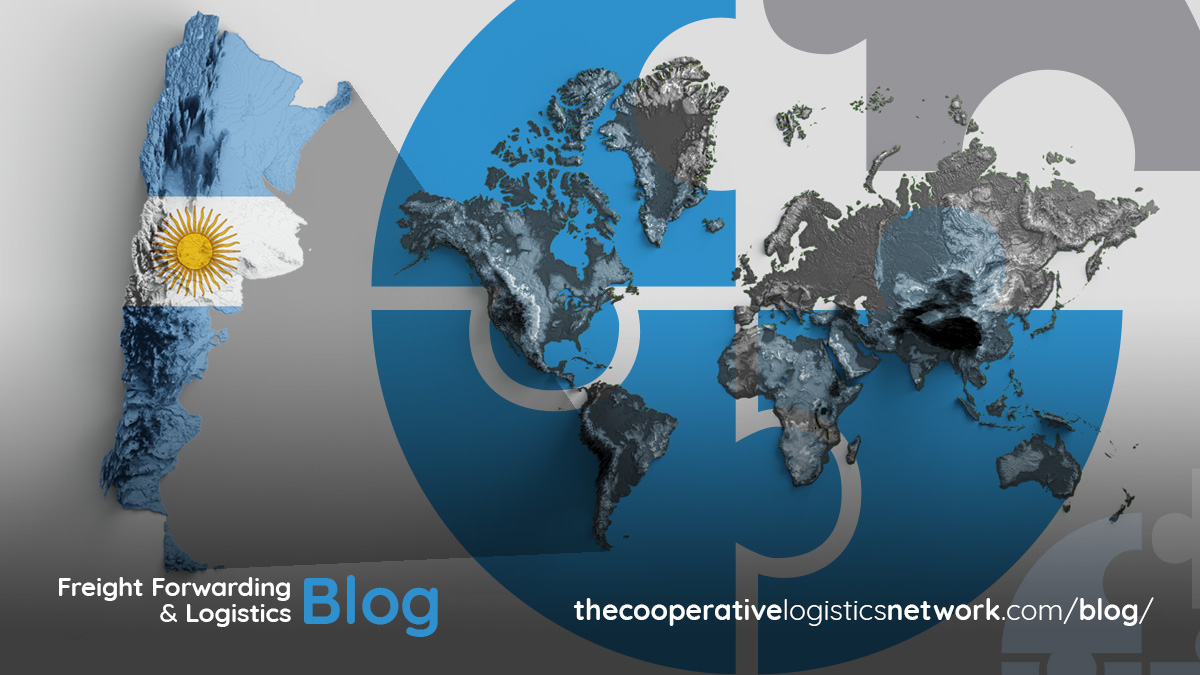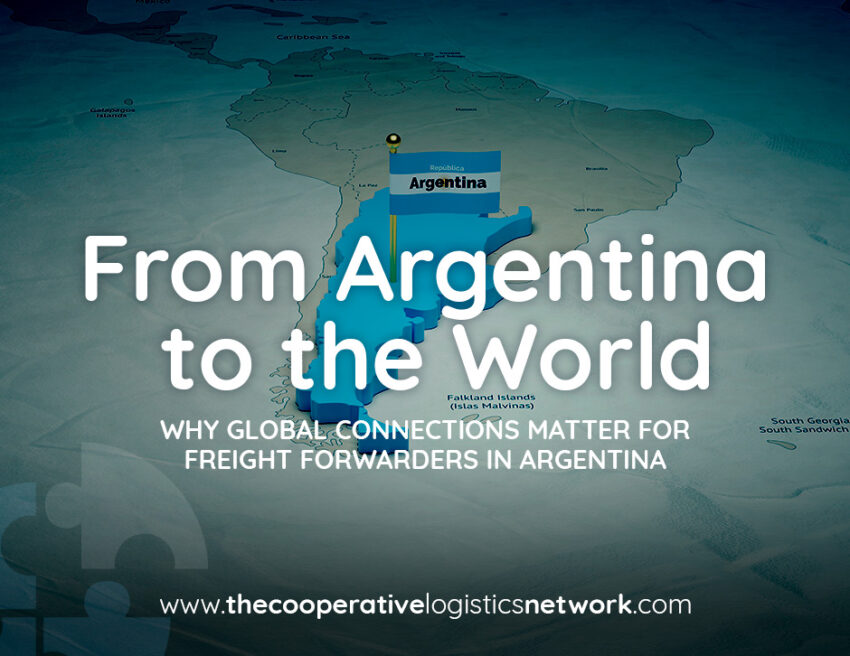Freight forwarders in Argentina operate in one of South America’s most strategic logistics hubs, yet they face increasingly complex challenges—from economic fluctuations and regulatory changes to rising competition and customer expectations. In the world of international trade, location alone is no longer enough to guarantee success. In such a landscape, the ability to connect with reliable partners worldwide isn’t just helpful—it’s essential. For freight forwarders looking to future-proof their operations, expanding their reach through global logistics networks is becoming the key to sustainable growth.

Argentina’s role in regional and global trade
Argentina has long been a heavyweight in Latin America’s trade arena. With rich natural resources and robust export sectors such as agriculture, livestock, lithium, and wine, the country is a consistent contributor to global supply chains. Its geography—stretching from the Andes to the Atlantic—gives it several gateways to the world, including extensive port and airport infrastructure that forms the backbone of its logistics sector.
The country’s most significant seaports—such as the Port of Rosario, Port of Bahia Blanca, and the Port of Quequén—handle millions of tons of cargo every year. These ports are crucial for grain and agricultural exports, among other commodities. Meanwhile, airports like Ministro Pistarini International Airport (Ezeiza) and Córdoba International Airport support Argentina’s growing air freight market, facilitating faster delivery of goods across continents.
Yet, despite this strategic positioning, freight forwarders in Argentina often find themselves limited by lack of international visibility or access to trustworthy overseas partners. The world of logistics is highly interconnected, and without strong global ties, even the most efficient local operations can find themselves struggling to scale up or compete with international players.
Why global partnerships are essential for freight forwarders in Argentina
Logistics today is as much about relationships as it is about infrastructure. Having access to ports and airports is fundamental, but equally important is having dependable partners on the other side of the shipment—whether that be in Asia, Europe, Africa, or North America. A delayed response, miscommunication, or unfamiliarity with customs regulations in a partner’s country can lead to significant setbacks, lost clients, and revenue.
This is why many freight forwarders in Argentina are turning to global freight networks like The Cooperative Logistics Network. These logistics alliances bring together reliable independent freight forwarders from across the world, offering members access to a vetted pool of partners with proven operational capabilities and shared standards of service. By being part of such a network, Argentinian forwarders can move cargo more confidently, knowing they’re collaborating with trusted professionals who understand the nuances of local logistics in their respective regions.
Strengthening efficiency through collaboration
Efficiency is one of the most valuable currencies in the freight forwarding industry. Clients expect timely delivery, competitive pricing, and real-time updates. When forwarders operate in isolation, managing overseas shipments can become a logistical nightmare—especially when navigating customs, taxes, documentation, and local delivery options in a foreign country.
Freight forwarders in Argentina who join a global network gain an immediate edge in this regard. Through access to a reliable partner base, they can coordinate faster, secure better rates, and minimize the risk of operational errors. The result is not just better service, but also improved client satisfaction, repeat business, and long-term growth.
Furthermore, these networks often offer tools that streamline communication, rate negotiation, and document sharing—reducing the administrative burden and helping forwarders focus on what matters most: growing their business.
Real opportunities for business expansion
It’s no secret that many small and mid-sized freight forwarders in Argentina are looking to expand their international footprint. However, this ambition often clashes with the high costs and risks associated with opening new branches abroad or building bilateral relationships from scratch.
Global freight networks eliminate these barriers by providing instant access to hundreds of trusted partners in key markets. Whether you’re shipping electronics to Seoul, pharmaceuticals to Frankfurt, or perishables to Nairobi, being part of a logistics network opens up doors that would otherwise be closed or too costly to pursue.
Moreover, networks, like The Cooperative Logistics Network, actively encourage cross-border collaboration among members through tools like member-exclusive communication platforms, freight rate databases, and even payment protection mechanisms that reduce financial risks.
Face-to-face networking and learning
Another significant advantage of joining a logistics network is the opportunity to attend international meetings and conferences where members connect in person. For freight forwarders in Argentina, these gatherings offer a chance to deepen trust with overseas agents, discuss potential collaborations, and showcase their company’s strengths on a global stage.
The Cooperative’s Annual Meeting is a perfect example of this. These in-person gatherings go beyond just exchanging business cards—they’re designed to help members build real relationships that translate into concrete partnerships and new projects. They also include one-on-one meetings, workshops, and social events that make networking more productive and enjoyable. The Coop’s 8th Annual Meeting scheduled to take place from 28th to 30th May 2025, in Abu Dhabi, will be joined by more than 200 independent freight forwarders looking forward to expanding their operations and finding new reliable partners to work with.
Join us today and register for our Annual Meeting!
It’s during these face-to-face interactions that many members discover new trade routes, find solutions to specific shipment challenges, and even co-develop tailored logistics strategies. For an independent freight forwarder in Argentina, this kind of exposure is invaluable.
How The Cooperative Logistics Network can add value to freight forwarders in Argentina
The Cooperative Logistics Network stands out for its focus on collaboration, integrity, and mutual growth. For freight forwarders in Argentina, joining such a network isn’t just a strategic move—it’s a smart investment in their future. With nearly 380 agents across 140 countries, The Cooperative Logistics Network is more than just a regular logistics network, its like a family of vetted and trusted freight forwarders who co-operate in a financially secure environment to reduce costs and risks and grow their businesses by actively working together to compete against the largest multinationals.
Members benefit from geographical exclusivity, which reduces competition within the network, and enjoy support through initiatives like FreightViewer—an online freight rate management tool that allows members to generate instant quotations, automate quoting processes, and offer professional proposals to clients. This type of technology is a game-changer for forwarders wanting to keep up with the digital transformation of the industry.
Being part of The Cooperative also means having access to an extended marketing platform, visibility through network publications, and ongoing support from a central team that works to ensure strong, active cooperation among members.
Final Thoughts: Looking Beyond Borders
As the global logistics landscape continues to evolve, freight forwarders in Argentina must look beyond their borders to stay competitive. The local industry is rich with potential, but capitalizing on that potential requires more than just infrastructure and local knowledge. It demands strong international relationships, access to reliable partners, and the tools to work efficiently across time zones and customs barriers.
By joining a network like The Cooperative Logistics Network, forwarders in Argentina can plug into a powerful global ecosystem that supports their ambitions, mitigates their risks, and helps them thrive in an increasingly interconnected world.
It’s no longer about being the biggest player—it’s about being the best connected.


